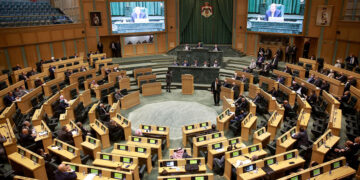Senate and House Foreign Relations/Affairs, Intelligence, Armed Services, and related Appropriations Subcommittee Members Should Disclose All Communications with Egyptian Officials and Agents
(Washington, D.C., August 14, 2024): In the wake of the July 2024 conviction of Senator Robert Menendez for accepting bribes from Egypt to facilitate approval of U.S. military assistance to the country and revelations about a thwarted investigations into a $10 million bribe from Egypt to then candidate Donald Trump, the Department of Justice (DOJ) should conduct a comprehensive investigation of all communications between Egyptian officials and foreign agents (together, "Egypt Agents"), and members of the U.S. Congress to determine other possible instances of unlawful influence and bribery, said DAWN today.
Members of Congress, in particular all members of the Senate and House Foreign Relations, Affairs, Appropriations, and Armed Services Committees, should make public all of their communications with Egyptian Agents to ascertain what efforts these agents made to influence decisions on military aid to the country.
"It is astounding that just after a U.S. court concluded that Egyptian Agents had bribed one of the most senior members of the Senate to assure continued military aid to the country, the House and Senate Appropriations Committees have sought to reward Egypt's regime with another $1.3 billion worth of military aid," said Sarah Leah Whitson, Executive Director of DAWN. "While Senator Menendez will soon be sitting in jail to contemplate his betrayal of our nation, General Sisi will be counting his billions in new weapons from duped American taxpayers."
Bribery by Egyptian Officials
Just in the past year, there have been significant revelations about Egyptian government attempts to bribe U.S. officials and candidates for political office to secure favorable treatment, including military aid and political protection, from the U.S. government. Egypt appears to have targeted extremely high level officials, including Senator Robert Menendez and then-candidate Donald Trump, with bribes, representing a grave threat to U.S. national security. These illegal bribery schemes are further buttressed with the political influence that Egypt has secured by employing former government officials as its agents to lobby for influence with congressional officials.
"Egypt's scheme to corrupt senior U.S. officials has undermined the integrity of our democratic institutions, affected the obligation of U.S. foreign military assistance, and impacted Congressional decision-making on major arms transfers to Egypt," said Josh Paul, Senior Advisor at DAWN, who testified for the U.S. Government at Menendez' trial. "Though the Constitution's speech and debate clause limited the evidence that the prosecution could introduce, and that I could speak to, at the trial, it is important that the American people understand that Senator Menendez' actions during the period he was accepting Egyptian bribes impacted both the obligation process for a billion dollars in U.S. taxpayer funding, and the approval process for major arms sales, including tank ammunition."
Menendez Bribery Scheme
On July 16, 2024, a federal jury in Manhattan found former Chairman of the Senate Foreign Relations Committee Robert Menendez guilty on 16 criminal counts, including bribery, illegally acting as a foreign agent for Egypt, extortion, and obstruction of justice. Evidence presented at the trial, as well as subsequent media investigations, revealed a years-long Egyptian scheme to bribe the Senator and his wife, Nadine Menendez, with hundreds of thousands of dollars of cash and valuables in exchange for Senator Menendez ensuring continued military aid and weapons to Egypt. Below is a chronological timeline of the bribery scheme and its influence on key decisions by the U.S. on military aid to Egypt, as revealed in the Justice Department's indictment against the senator and his co-conspirators:
- March 2018: Major General Khaled Ahmed Shawky Osman met with Senator Menendez at his Senate office, along with Nadine Menendez and Wael Hana, a businessman with deep ties to the Egyptian government. They discussed U.S. foreign military financing (FMF) to Egypt.
- May 2018: Senator Menendez provided sensitive, non-public details about personnel at the U.S. Embassy in Cairo and military aid policies to Egyptian intermediaries. Later that same month, Senator Menendez ghost-wrote a letter on behalf of the Egyptian government, seeking to convince other U.S. senators to lift a hold on $300 million in aid to Egypt.
- May 2018: Major General Shawky received a text from Hana, who had been informed by Menendez about non-public details of U.S. military aid to Egypt: "The ban on small arms and ammunition to Egypt has been lifted. That means sales can begin, including sniper rifles and other articles."
- July 2018: After a dinner with Major General Shawky, Senator Menendez agreed to lift a hold on U.S. aid to Egypt.
- March 2019: Sarah Arkin, an aide to Senator Robert Menendez, drafted a letter that used strong language to criticize the president of Egypt and the country's human rights record. Senator Menendez declined to sign it.
- May 2019: General Ahmed Helmy, Egypt's "top spy in Washington" and Hana persuaded Senator Menendez to pressure his Senate colleagues to unblock military aid to Egypt and to demand that the U.S. Department of Agriculture stop opposing certification of Hana's company, IS-EG Halal, as the sole halal certifier for Egypt-bound exports.
- June 2019: Hana facilitated significant payments towards Nadine Menendez's mortgage and worked to resolve disputes related to U.S. aid and Egyptian business interests.
- August 2019: Hana and Fred Daibes, Menendez's longtime friend, made additional payments to Nadine Menendez through Strategic International Business Consultants, totaling $30,000 between August and November 2019, to secure Menendez's continued assistance for Hana and Egypt.
- March 2020: Nadine Menendez arranged a meeting for General Helmy and Senator Menendez to discuss Egypt's opposition on the Grand Ethiopian Renaissance Dam (GERD), without disclosing the meeting to his staff.
- October 2020: General Helmy introduced Nadine Menendez to Mai Abdelmaguid, an Egyptian intelligence official based in the Egyptian Embassy in Washington D.C., just a few days after Nadine and Bob Menendez married.
- Between October and December 2020: Mai Abdelmaguid urged the Menendezes to visit Egypt. She also told Nadine Menendez that her bosses were "keen to meet" Representative Gregory W. Meeks, a New York Democrat who, as the ranking member of the House Foreign Affairs Committee, held significant sway over the allocation of foreign military aid.
- Early 2021: Hana coordinated the purchase of thousands of dollars' worth of personal products, paid for by IS EG Halal, to be delivered to the Menendez home.
- June 2021: Nadine Menendez and Abdelmaguid coordinated the visit of General Abbas Kamel, the head of the Egyptian General Intelligence, to Washington, D.C.
- Early June 2021: Menendez passed Nadine Menendez an article that she shared with Abdelmaguid about the role of Egypt in the murder of Jamal Khashoggi, suggesting that they prepare a rebuttal to the questions U.S. senators would ask General Kamel about the murder. "Wanted to give you a heads up so you can prepare your answers," Ms. Menendez said in a text message. Later in June, Hana purchased 22 one-ounce gold bars with unique serial numbers, which were later found in the Menendez home.
- September 2021: Senator Menendez instructed congressional staff to coordinate a congressional delegation trip to Egypt with Egyptian spy Abdelmaguid. Abdelmaguid complained to Nadine Menendez that this instruction to staff would cost her job and blow her cover.
- January 2022: Nadine Menendez sent Hana a link to a news article reporting on foreign military sales to Egypt totaling approximately $2.5 billion, writing, "Bob had to sign off on this."
But despite all the above, billions of U.S. tax dollars have been sent to Egypt, including:
- September 2022: Although the Biden Administration blocked $130 million in military assistance to Egypt due to the government's human rights violations – a small fraction of its annual earmark of $1.3 billion in FMF – it also approved $2.5 billion in arms sales to Egypt that same year.
- September 2023: A provision in a 2023 omnibus spending bill – which, once again, would have withheld $130 million from Egypt due to the government's human rights abuses – was whittled down to $85 million during negotiations in the Senate. Although up to $320 million could have been withheld because that entire sum is conditioned on human rights benchmarks, the U.S. government only held back $85 million in FMF.
- June and July 2024: The House Appropriations Committee appropriated $1.375 billion in June and the Senate Appropriations Committee appropriated $1.3 billion in FMF for Egypt.
"Despite the mountain of evidence that was sufficient to find Senator Menendez guilty for taking Egyptian bribes, it's hard to understand why the U.S. government has taken no action to hold Egypt and its agents accountable for their corruption of our government," said Whitson. "The U.S. government needs to explain to the American people why it has not sought to prosecute the Egyptian Agents implicated in the bribery, or to punish the Egyptian government for so grossly abusing American largesse and support."
Key Egyptian Agents Implicated in the Menendez Bribery Scheme
The indictment and prosecution of Senator Menendez and his co-conspirators identified several Egyptian officials involved in the bribery scheme. It would be particularly important for Members of Congress to disclose whether they had any communications with any of these officials. They include:
- Mai Abdelmaguid, an Egyptian intelligence agent based out of the Egyptian embassy in Washington D.C., was introduced to Nadine Menendez shortly after her marriage to the Senator on October 3, 2020. Evidence produced by the DOJ shows that the two women frequently passed each other sensitive information for the benefit of the Egyptian government, including one text exchange in which Abdelmaguid conveyed a request for an introduction to Representative Gregory Meeks, and another in which Nadine Menendez passed on information that raised questions about whether Egyptian officials were involved in the murder of DAWN founder Jamal Khashoggi.
- General Ahmed Helmy, who is known as Egypt's top spy in Washington D.C., held at least four meetings with Senator Menendez to discuss the provision of FMF to Egypt. Helmy was also in regular contact with Senator Menendez via his intermediaries, including in one text exchange in which he declared that Senator Menendez would "sit very comfortably" were he to help unblock an expected shipment of military aid and another in which Nadine Menendez wrote to him: "Anytime you need it anything you have my number and we will make everything happen."
- Major General Khaled Ahmed Shawky Osman also held at least two meetings with Senator Menendez to discuss the provision of FMF to Egypt and engaged in multiple exchanges with Senator Menendez's intermediaries. In one exchange, Shawky referred to Senator Menendez as "Bob," a moniker that was not commonly used by individuals who interacted with the Senator.
- General Abbas Kamel, the head of Egyptian Intelligence Services, met with Senator Menendez and his wife at a hotel in Washington D.C. on June 21, 2021, the day before Kamel was scheduled to meet with Senators who had raised concerns about Egypt's human rights record.The couple briefed Kamel about what questions to expect during the meeting, and allegedly discussed how to respond to Senators who planned to ask the Kamel about reports that the Saudi plane carrying Khashoggi's assassins stopped in Cairo to pick up the drugs that were used in his murder.
Donald Trump Bribery Scheme
Recent reporting by the Washington Post uncovered information about a halted federal investigation into a secret $10 million dollar payment from the Egyptian government to Donald Trump in 2017. This includes the following details:
- September 19, 2016: Candidate Trump met with General Sisi in New York City, telling him that the United States would be a "loyal friend" to Egypt if he was elected president and praising Sisi on Fox News as a "fantastic guy."
- January 15, 2017: Five days before Trump was inaugurated as president on January 20, the "Research and Studies Center," an organization linked to the Egyptian intelligence services, withdrew $10 million in cash from the National Bank of Egypt in Cairo to allegedly be used to boost Donald Trump's 2016 presidential election campaign funds.
- March 2017: The Central Intelligence Agency briefed Justice Department officials that General Sisi had sought to send money to Trump. Federal investigators commenced an investigation into the bribery scheme.
- April 2017: Trump invited General Sisi as one of his first official guests to the White House, the first such visit following Sisi's military coup in Egypt in 2013.
- May 2018: The Trump Administration lifted restrictions on $195 million in military aid to Egypt over human rights abuses in Egypt, followed by the release of $1.2 billion more in such assistance.
- 2019: Trump Attorney General blocked further investigation into the case by refusing to allow further inquiry into Trump bank accounts.
- January 2020: Prosecutors ended their investigation.
Foreign Agents Working for Egypt
The Egyptian government relies on highly paid Washington lobbyists, including the following individuals, to whitewash its human rights record and influence U.S. policy to its advantage.
- Nadeam Elshami, former Chief of Staff for Speaker of the House Nancy Pelosi, is currently a lobbyist for Brownstein Hyatt Farber Schreck (BHFS), where he works as a foreign agent representing the interests of the Egyptian government. Elshami and BHFS work to press the U.S. for billions of dollars of military assistance to the Egyptian government, despite its widespread and systematic human rights abuses, and receive a monthly fee of $65,000 from Egypt.
- Ed Royce, Former Chair of the House Foreign Affairs Committee, is the current Policy Director for BHFS, where he represents both Egypt and Saudi Arabia. Royce has leveraged his political contacts and influence to secure meetings for Egyptian officials with members of Congress and their staff.
While the DOJ focused its investigation solely on the crimes of Senator Menendez and his associates, it should now investigate all actions and communications by all Egyptian Agents to understand the full picture of Egypt's unlawful influence campaign against the U.S. government. Pending such an investigation, members of Congress should voluntarily disclose records of their communications with all Egyptian Agents.
Military Aid to Egypt
Since 1987, the U.S. has appropriated for Egypt an average of $1.3 billion in military assistance each year. In June, 2024, the House Appropriations Committee appropriated $1.375 billion to Egypt in FMF. On July 25, 2024, the Senate Appropriations Committee advanced its foreign aid bill for fiscal year 2025, marking a new shift in the allocation and oversight of U.S. aid to Egypt.
Like last year, the Senate bill maintains $1.3 billion in FMF and requires tying approximately $320 million of the amount to human rights benchmarks. The recent bill also includes a symbolic new provision requiring the Egyptian government to redirect an amount equal to the interest earned from the Federal Reserve Bank of New York on its U.S. taxpayer funds towards democracy programs, economic growth, and humanitarian assistance. Although some may laud this provision as a positive step forward for Egypt, the Bill continues to allow the Egyptian government to earn interest from the Federal Reserve, and to use that interest to purchase additional weapons to add to its stockpile, while only paying lip service to a meager effort to uphold democratic values in Egypt.
"What is needed is an end to U.S. military aid to Egypt's authoritarian regime," said Raed Jarrar, DAWN's Advocacy Director. "Imposing partial human rights conditions and applying minimal requirements for democratic reform only perpetuates the false notion that President Al-Sisi will transform into a democratic leader. The most effective way to support democracy and human rights in Egypt is to cease financing the regime."
Military aid to Egypt neither complies with U.S. law nor serves U.S. national and security interests. U.S. law, such as Section 502B of the Foreign Assistance Act states that a primary goal of U.S. foreign policy is to "promote the increased observance of internationally recognized human rights by all countries" and prevents the provision of military aid to governments that engage in a "consistent pattern of gross violations of internationally recognized human rights." This restriction can only be waived if the U.S. President certifies to Congress that "extraordinary circumstances" justify the action and requires the Secretary of State to submit annual reports to Congress that detail the human rights record of each country under consideration for security assistance.
The Egyptian government's long record of ongoing human rights abuses have been well-documented. Today marks the eleventh anniversary of the Egyptian government's massacre of over 1,100 men, women, and children in Rabaa and al-Nahda Squares as they protested the military coup in the country led by General Sisi. Abuses continue to include the detention of tens of thousands of political prisoners, the extrajudicial execution and torture of detainees, and the widespread and systematic use of torture and enforced disappearances. The government has also stripped the judiciary of its independence, shuttered hundreds of civil society groups and news publications, and passed draconian counter-terrorism laws with harsh penalties for protest, assembly, and speech. This persistent record of abuses should preclude Egyptian eligibility for military assistance, but the U.S. government has failed to enforce its own laws that prohibit aid to abusers.
In addition, despite decades of military assistance and political protection, the Egyptian regime remains brittle and unstable, with little to offer the U.S. in exchange for military protection. While some have justified aid to Egypt as its incentive to remain tied to a peace agreement with Israel, there is no reason to believe that agreement would suffer regardless of U.S. military aid.
"There are so many reasons to end U.S. military aid to Egypt, which neither complies with U.S. laws prohibiting aid to abusive regimes nor serves U.S. national interests, but at this point, the number one reason should be its brazen efforts to corrupt and undermine our own democracy," said Whitson.







































